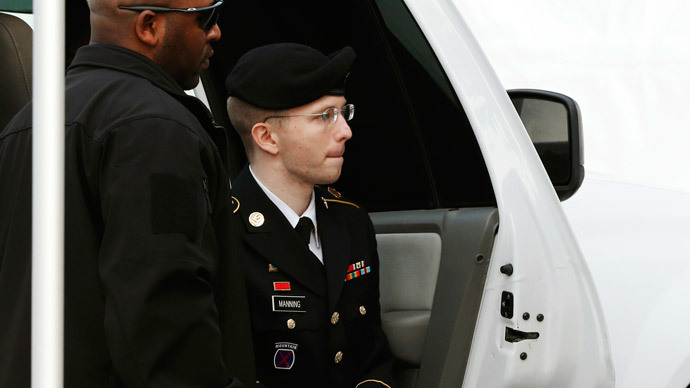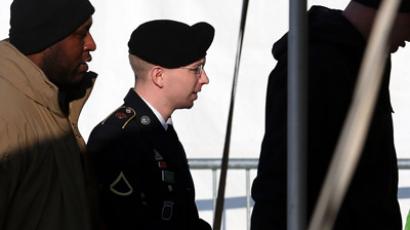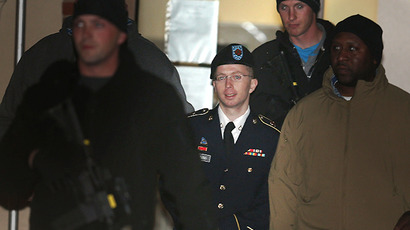Manning attorney denounces unfair trial, files clemency papers

WikiLeaks source Chelsea Manning did not receive a fair trial, the attorney who represented her in last year’s court-martial wrote on Wednesday, and her counsel has taken the next steps in seeking clemency from the United States military.
Trial attorney David E. Coombs weighed in on Manning’s ongoing fight for freedom in a rare statement issued from his Providence, Rhode Island law office late Wednesday in which he spoke harshly of the results of last year’s legal proceedings.
“I have fought to ensure that she received a fair trial and a just result,” Coombs said towards the start of a blistering two-and-a-half-page statement. “Unfortunately, I do not believe that she received either.”
Manning, a 26-year-old former intelligence analyst for the US Army, was convicted by a military judge last August of multiple counts related to her admitted role in supplying the anti-secrecy organization WikiLeaks with a trove of sensitive documents in 2009 and 2010 that were later published on the group’s website. She had been arrested in May 2010 while serving during the Iraq War under her birth name, Bradley Manning, and announced she identified as female last September after being sentenced by Col. Denise Lind to 35 years in prison. Manning previously faced the possibility of life in prison until being acquitted of the most serious offense presented by the government: aiding the enemy.
US prosecutors have yet to prove that Manning’s disclosures caused the country any harm beyond embarrassment, however, and the WikiLeaks revelations and the discussions spawned by the previously secret documents have polarized the international community during the last several years and landed the former soldier with accolades that include Noble Prize nominations.
In this week’s statement, Mr. Coombs wrote that he has ended his representation of Manning for her court-martial as of Tuesday when he filed clemency paperwork with the office of Major General Jeffrey Buchanan, the head of the US Army’s Military District of Washington and thus the “convening authority” in the case that can reverse the charges against Manning if he so choses to.
Manning’s appeal process will be handled not by Coombs, but rather civilian appellate counsel Nancy Hollander of the firm Freedman Boyd Hollander, he said in the statement, who can argue the case before the Army Court of Criminal Appeals after Maj. Buchanan reviews Col. Lind’s ruling.
“We are honored that Chelsea Manning has chosen us to represent her on appeal and we enter this case with our full commitment to it,” Hollander said in a separate statement earlier this month. “As soon as we have the record of trial, we will turn every page and research all issues. We will not let fear or intimidation interfere with her constitutional rights.”
Coombs isn’t totally walking away from the matter, however, and wrote that he will continue to help his client in pursuing both an official name change and hormone replacement therapy while behind bars.
Nevertheless, he used the opportunity to formally announce his removal from the case to talk at length about the controversial legal proceedings that took both the prosecution and defense nearly three years to prepare for.
Regardless of the aiding the enemy acquittal, Coombs wrote that “any unauthorized leak to the media of classified information is viewed tantamount” to such in the eyes of the US government, as evidenced by the prosecution’s adamant attempts throughout trial to land a guilty verdict with regards to that count.
“The government-wide crackdown on whistleblowers and the extension of this crackdown to journalists threatens to stifle the very freedoms that we have fought so hard to ensure,” Coombs wrote, who earlier in the statement acknowledged that the prosecution admitted they’d attempt to charge the New York Times with aiding the enemy if they published the documents that WikiLeaks first disclosed.
“It should not come as a surprise to anyone that there are leaks of classified information to the media just about every day,” Coombs continued. “The administration tacitly condones many of these leaks because the information released either makes the government look good or it is something that the administration wants in the public realm.”
“Given the regularity with which classified information is leaked to members of the press, it was somewhat surprising that the government reacted so harshly to the leaks by PFC Manning,” he added. “The information released by PFC Manning, while certainly greater in scope than most leaks, did not contain any Top Secret or compartmentalized information. The leaked information also did not discuss any current or ongoing military missions. Instead, the Significant Activity Reports (SIGACTs), Guantanamo detainee assessments, Apache Aircrew video, diplomatic cables and other released documents dealt with events that were either publicly known or certainly no longer sensitive at the time of release.”
For disclosing those materials to WikiLeaks, prosecutors charged Manning with 22 offenses that included, in addition to aiding the enemy, computer fraud, theft, disobeying official orders and violating the federal Espionage Act of 1917.
“Despite the information no longer being sensitive, our government was quick to condemn the leaks since the release had embarrassed the United States,” Coombs continued. “Due to this embarrassment, multiple elected officials and high level government employees made inflammatory comments about PFC Manning and her case. Some elected officials called for PFC Manning to receive the death penalty.”
Coombs said, “it is my hope that the convening authority, Major General Jeffrey S. Buchanan, will take this opportunity to act when others have not. It is within his power to disapprove the improper findings of guilt and to reduce the unjust sentence.” The clemency papers filed with Buchanan’s office, Coombs said, include more than 6,000 letters from supporters of his client and an Amnesty International petition containing nearly 39,000 signatures.














